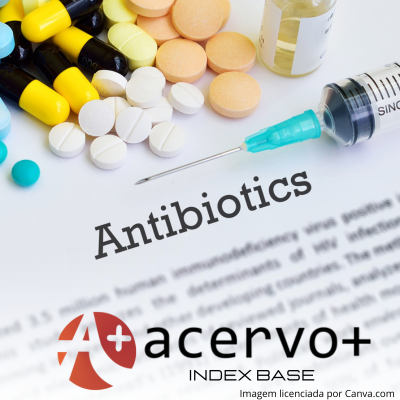Como a automedicação com antibióticos impacta na microbiota do trato gastrointestinal
##plugins.themes.bootstrap3.article.main##
Resumo
Objetivo: Evidenciar de forma clara e objetiva os impactos da automedicação com antibióticos na microbiota do trato gastrointestinal. Métodos: Este artigo utilizou estudos randomizados, abertos e multicêntricos com exposição de indivíduos a antibióticos e grupo placebo com análises fecais, estudos transversais e de triagem com análise do microbioma intestinal, por metagenômica shotgun, de indivíduos que fizeram terapia antimicrobiana e estudo seccional, epidemiológico e quantitativo com entrevistas e aplicação de questionários sobre a automedicação e o uso e conhecimento de antibióticos em uma determinada população. Resultados: Foi observado alterações na microbiota intestinal e em tratamentos contra infecções, disbiose, impactos na resposta imune e inflamatória do corpo, aumento da resistência de bactérias e modificações na estrutura do microbioma. Considerações finais: Conclui-se que a automedicação com antibióticos é predominante na população observada e estudada. Além disso, as consequências desse fenômeno refletem a falta de entendimento sobre a auto-administração de antimicrobianos e seus efeitos metabólicos.
##plugins.themes.bootstrap3.article.details##
Copyright © | Todos os direitos reservados.
A revista detém os direitos autorais exclusivos de publicação deste artigo nos termos da lei 9610/98.
Reprodução parcial
É livre o uso de partes do texto, figuras e questionário do artigo, sendo obrigatória a citação dos autores e revista.
Reprodução total
É expressamente proibida, devendo ser autorizada pela revista.
Referências
2. BRASIL. Plano nacional de prevenção e controle da resistência aos antimicrobianos. Brasília, DF: Ministério da Saúde, 2019; 112p.
3. BURDET C, et al. Impact of antibiotic gut exposure on the temporal changes in microbiome diversity. Antimicrobial Agents and Chemotherapy, 2019; 63(10): e00820-19.
4. DOAN T, et al. Gut microbiome diversity and antimicrobial resistance after a single dose of oral azithromycin in children: a randomized placebo-controlled trial. American Journal of Tropical Medicine and Hygiene, 2024; 110(2): 291-294.
5. HAGAN T, et al. Antibiotics-driven gut microbiome perturbation alters immunity to vaccines in humans. Cell, 2019; 178(6): 1313-1328.e13.
6. AHMED I, et al. Determinants of antibiotic self-medication: A systematic review and meta-analysis. Research in Social and Administrative Pharmacy, 2023; 19(7): 1007-1017.
7. LANGDON A, et al. Microbiota restoration reduces antibiotic-resistant bacteria gut colonization in patients with recurrent Clostridioides difficile infection from the open-label PUNCH CD study. Genome Medicine, 2021; 13(1): 28.
8. LEBEAUX RM, et al. Impact of antibiotics on off-target infant gut microbiota and resistance genes in cohort studies. Pediatric Research, 2022; 92(6): 1757-1766.
9. LEO S, et al. Effects of antibiotic duration on the intestinal microbiota and resistome: The PIRATE RESISTANCE project, a cohort study nested within a randomized trial. EBioMedicine, 2021; 71: 103566.
10. LIOU JM, et al. Long-term changes of gut microbiota, antibiotic resistance, and metabolic parameters after Helicobacter pylori eradication: a multicentre, open-label, randomised trial. Lancet Infect Dis, 2019; 19(10): 1109-1120.
11. MERRICK B, et al. Faecal microbiota transplant to eradicate gastrointestinal carriage of antibiotic-resistant organisms (FERARO): a prospective, randomised placebo-controlled feasibility trial. BMJ Open, 2020; 10(5): e038847.
12. MUFLIH SM, et al. The impact of health literacy on self-medication: a cross-sectional outpatient study. Journal of Public Health, 2022; 44(1): 84-91.
13. NAKAKANDE J, et al. The utility of internet-enabled antibiotic self-medication and its associated factors among patients attending private clinics in Kawempe Division in Kampala Capital City, Uganda: community-based cross-sectional study. Drug Healthc Patient Saf, 2023; 15: 85-91.
14. NGUYEN CT, et al. Prevalence and impacts of self-medication in a disadvantaged setting: the importance of multi-dimensional health interventions. Frontiers in Public Health, 2023; 11: 1176730.
15. OLIVEIRA DE SOUSA FF e MONTEIRO M. Percepción asociada a la automedicación con antimicrobianos en farmacias de Fortaleza, Brasil [Perception of self-medication with antibiotics in pharmacies of Fortaleza, Brazil]. Atenção Primária, 2020; 52(2): 125-127.
16. ORGANIZAÇÃO MUNDIAL DA SAÚDE. Global antimicrobial resistance surveillance system (GLASS) report: early implementation 2017-2018. Genebra: Organização Mundial da Saúde, 2019; 268p.
17. PAULSAMY P, et al. Parental health-seeking behavior on self-medication, antibiotic use, and antimicrobial resistance in children. Saudi Pharmaceutical Journal, 2023; 31(9): 101712.
18. REYMAN M, et al. Effects of early-life antibiotics on the developing infant gut microbiome and resistome: a randomized trial. Nature Communications, 2022; 13(1): 893.
19. RUSSELL CL. An overview of the integrative research review. Prog Transplant, 2005; 15(1): 8-13.
20. RUSSELL JT, et al. Antibiotics and the developing intestinal microbiome, metabolome and inflammatory environment in a randomized trial of preterm infants. Scientific Reports, 2021; 11(1): 1943.
21. TIGUMAN GMN, et al. Use and self-medication with antibiotics among adults in the Brazilian Amazon: a panel of two cross-sectional studies, 2015 and 2019. Expert Review of Anti-Infective Therapy, 2020; 18(12): 1263-1270.
22. WIEËRS G, et al. Do probiotics during in-hospital antibiotic treatment prevent colonization of gut microbiota with multi-drug-resistant bacteria? A randomized placebo-controlled trial comparing Saccharomyces to a mixture of Lactobacillus, Bifidobacterium, and Saccharomyces. Frontiers in Public Health, 2021; 8: 578089.
23. WILLMANN M, et al. Distinct impact of antibiotics on the gut microbiome and resistome: a longitudinal multicenter cohort study. BMC Biology, 2019; 17(1): 76.
24. ZEB S, et al. Self-medication as an important risk factor for antibiotic resistance: a multi-institutional survey among students. Antibiotics, 2022; 11: 842.

